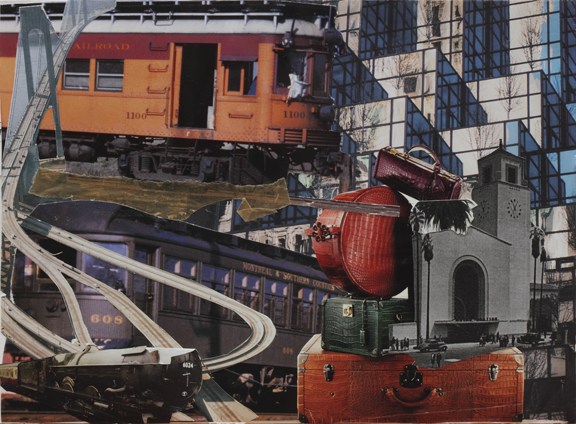
Trains
Union Pacific; Southern Pacific; Atchison, Topeka, and Santa Fe all have train routes that end in L.A. El Capitan, City of Los Angeles, Golden State: Aunty Emma is about to arrive on one from Detroit. Union Station, where we go to meet her, is wood, marble, leather, glass, and with a big staircase leading down to the tracks. Signs warn us not to go down these stairs, but though I point the signs out to Daddy, he tells me it’s okay and we keep on. I always trust my father, but this time I’m not so sure for I was able to read that “No” in big letters. When a porter asks where we’re going, Daddy says we’re meeting old folks who need our help. He’s right, we’re let through, but Daddy’s words seem like a lie. Aunty Emma isn’t old, not really, though she’s Baubie’s and Zadie’s first born and fourteen years older than Mama.However, I might be imagining. Maybe there’s no staircase at the station and, instead, Daddy and I meet the train outside in the warm Los Angeles evening. Or, perhaps, we stay seated in the waiting room until Aunty Emma makes her own way from the train, her baggage on a tall cart pushed by a porter.
Still the staircase I see is substantial, broad and deep, with sharp turns at each landing. My palm slides along the handrail as Daddy and I nearly run down the stairs toward the dark underground platform, the train pulling in. Aunty Emma descends with a valise, its metal snaps shiny; a hexagonal hatbox; a make-up case; a tall trunk. All this – staircase, underground track, Aunty Emma’s matching luggage – is as real as can be. Still I know all of it, including Aunty Emma’s traveling suit, might be borrowed from a glamorous black-and-white film in which the part of my aunt is played by Hedy Lamar, Ava Gardner, or some other dark beauty.
*
A little train circles Beverly Park where Daddy Bob takes me some lucky week-ends. There’s a train at Knott’s Berry Farm, too, where a robbery is staged, scaring the passengers or at least scaring me. The streetcars I ride with Aunty Riva are something like trains, and women on their way downtown to shop dress up, as women do when taking the train.
*
The train burrowed deepest is one I don’t see. It’s well after dinner at Ahmee’s. The steps between levels, the nooks and crannies, are perfect for playing, but now the indoor games with my cousins are ending. It’s dark in the rooms of the Brockmont Drive house – stained wood walls, dim bulbs under heavy lampshades. No streetlights through the bay windows, their dozens of tiny panes filled with night and soon covered by blinds. When I sleep over, Teddy, Cindy, Donny, and I are lined up in beds and cots under blankets, silent or whispering. If, instead of spending the night, I’ve come with my family, I’m sad because we’re about to leave. Ahmee smears butter on bread for my trip home. Or she opens the door to my cousins’ small bedroom and tells us all to go to sleep. Low light, no noise but the crickets, and then there’s a rumble, far but getting close. And closer. The insistent rhythm of wheels on track. And then the train whistle, sharp, a sound barely here and already leaving. This sound spirals into my chest bones, a cavity that feels empty but which I know holds my heart. Sound full of itself and, also, of absence. Presence and the echo of longing as the sound moves down the track and far away. And me still here, on a low cot in my cousins’ bedroom, too filled with feeling for sleep.
Judith Tannenbaum is a writer and teacher whose publications include: Disguised as a Poem: My Years Teaching Poetry at San Quentin, By Heart: Poetry, Prison, and Two Lives (with Spoon Jackson), Teeth, Wiggly as Earthquakes: Writing Poetry in the Primary Grades, Jump Write In!, and a number of poetry books and chapbooks. She currently works as training coordinator with San Francisco’s WritersCorps. “Trains” is part of a new project of prose and collages looking at early childhood sensory memory.
Editor's note: Judith died in 2020. She was my friend.

